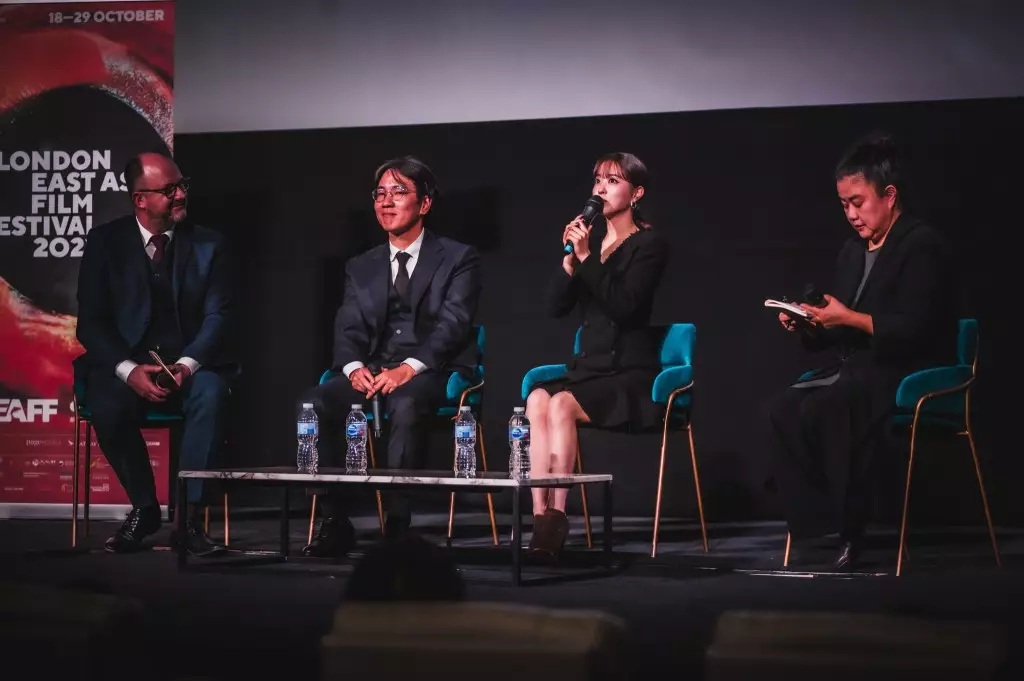The London East Asia Film Festival recently concluded with a remarkable finale that left the audience in awe. The event showcased the UK premiere of Concrete Utopia, an entrant from Korea for the prestigious Best International Feature Film category at the 2024 Oscars. This dystopian film, directed by Um Tae-hwa, captivated viewers with its unique storytelling and thought-provoking themes.
During the festival, the film Iron Mask, directed by Kim Sung Hwan, received the Best Film award. Additionally, the artistic director, Hyejung Jeon, presented the Rising Star award to Pak Bo-young, who delivered an outstanding performance in Concrete Utopia. The recognition of these talented individuals further enhanced the festival’s celebratory atmosphere.
Concrete Utopia explores the theme of survival in the face of adversity. This resonated strongly with the audience, as recent global events in Ukraine and Israel/Gaza have underscored the importance of resilience. The film’s protagonist, portrayed by the talented Lee Byung-hun, embodies a charismatic leader, while the story unfolds through the eyes of a young couple, Ming-seong and Park Bo-young. The sudden upheaval and irrevocable changes in their lives reflect the unpredictable nature of survival during a crisis.
Director Um Tae-hwa elucidated his intention behind the film during a Q&A session with actress Park Bo-young. He emphasized that Concrete Utopia should be seen as an apocalyptic film rather than a conventional disaster movie. According to Um, the disaster itself is of secondary importance compared to the characters and their responses to extreme circumstances. By gradually revealing their backstories, he ensures that the story’s flow remains uninterrupted.
Rather than focusing on gratuitous carnage, Um Tae-hwa delves into the theme of social hierarchies and the impact of stress on human behavior. The film portrays the high-rise residents’ quick transformation from compassionate neighbors to callous individuals, refusing shelter to those in need and condemning them to a bleak fate. Um highlights the societal implications by underlining the notion that one’s place of residence often defines their social status in Korean culture, a concept that can be relatable to many societies worldwide.
Actress Park Bo-young shared insights into her character’s development throughout the film. As she witnesses the transformation of her initially kind and humble husband, Park’s character undergoes a significant shift from passivity to assertiveness. This evolution highlights the film’s exploration of human morality and the choices individuals make when faced with extraordinary circumstances. Um Tae-hwa expressed his belief that no character can be wholly good or evil in Concrete Utopia, offering viewers the opportunity to empathize with each character and question the ethical implications of their choices.
Concrete Utopia’s ability to convey the ordinary nature of its characters’ decision-making process contributes to its chilling impact. Um Tae-hwa’s emphasis on the relatability of the characters evokes a sense of unease, as viewers recognize their capacity for making similar choices in desperate situations. The film prompts deeper introspection by raising ethical questions concerning self-preservation and the morality of individual actions in times of crisis.
The London East Asia Film Festival concluded on a high note with the premiere of Concrete Utopia, a thought-provoking film that traverses apocalyptic themes and challenges societal norms. Director Um Tae-hwa masterfully crafts a narrative that engages the audience through its exploration of survival, social hierarchies, and moral dilemmas. The exceptional performances, particularly by Pak Bo-young, contribute to the film’s impact and further solidify its place in the realm of cinematic excellence. As the curtains closed on the festival, attendees were left with a renewed appreciation for the power of storytelling and its ability to ignite critical conversations about the human condition.


Leave a Reply